The Purpose of Education and Teaching Philosophy to Children
VerifiedAdded on 2023/06/12
|24
|6242
|434
Essay
AI Summary
This essay delves into the multifaceted purpose of education, questioning whether its primary aim should be to prepare individuals for their societal roles or to foster a broader understanding of human existence. It argues that while education often serves to integrate individuals into existing social and economic structures, true education should equip individuals with the critical thinking skills necessary to navigate and challenge societal norms. The essay further explores the benefits of introducing philosophy to children, highlighting its potential to cultivate critical thinking, problem-solving skills, and emotional development. By encouraging children to question, reason, and explore different perspectives, philosophy can enhance their overall learning experience and empower them to become independent thinkers and active contributors to society. The essay emphasizes that philosophy should complement other subjects in the curriculum, fostering a deeper understanding and encouraging students to apply their knowledge in practical life situations. Desklib provides access to this and other educational resources for students.
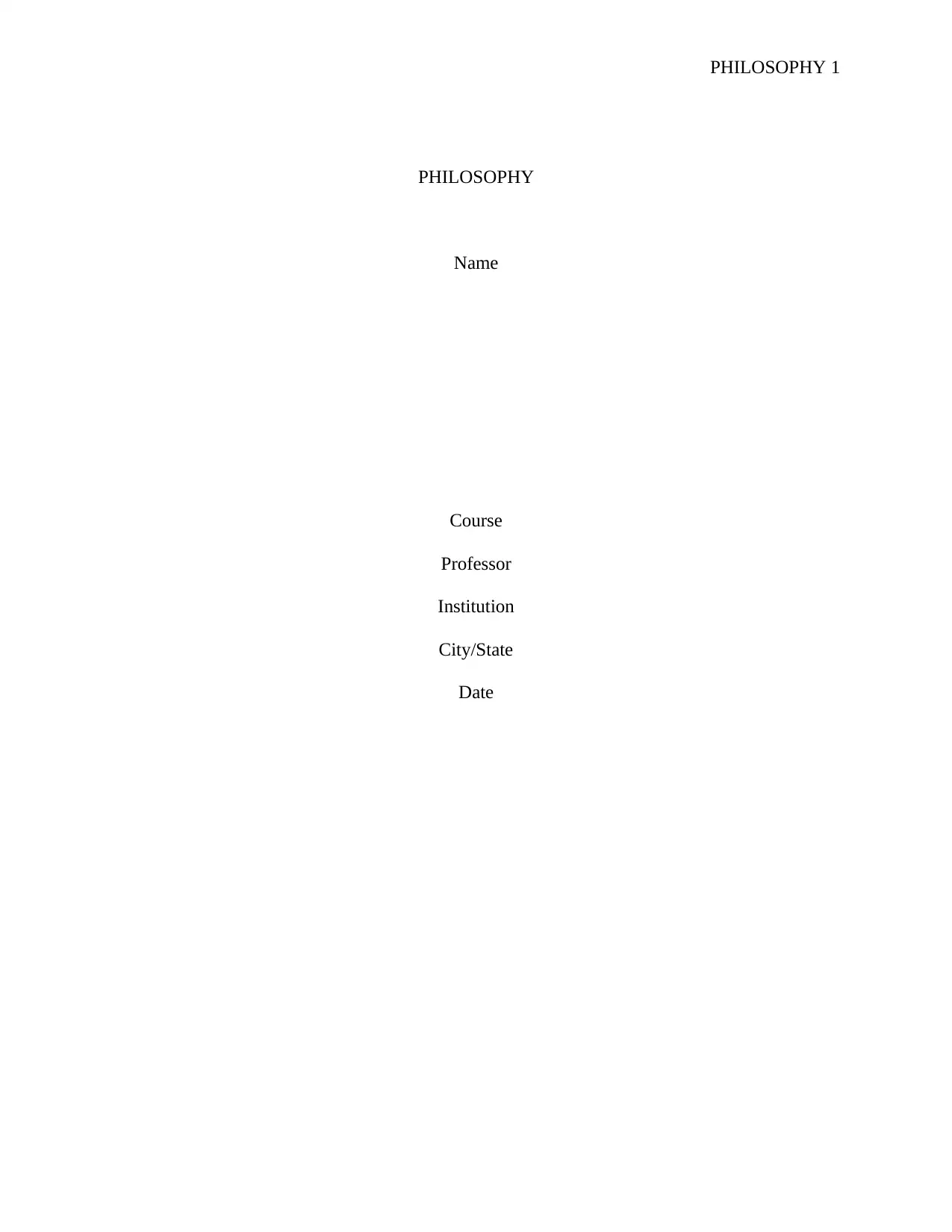
PHILOSOPHY 1
PHILOSOPHY
Name
Course
Professor
Institution
City/State
Date
PHILOSOPHY
Name
Course
Professor
Institution
City/State
Date
Paraphrase This Document
Need a fresh take? Get an instant paraphrase of this document with our AI Paraphraser
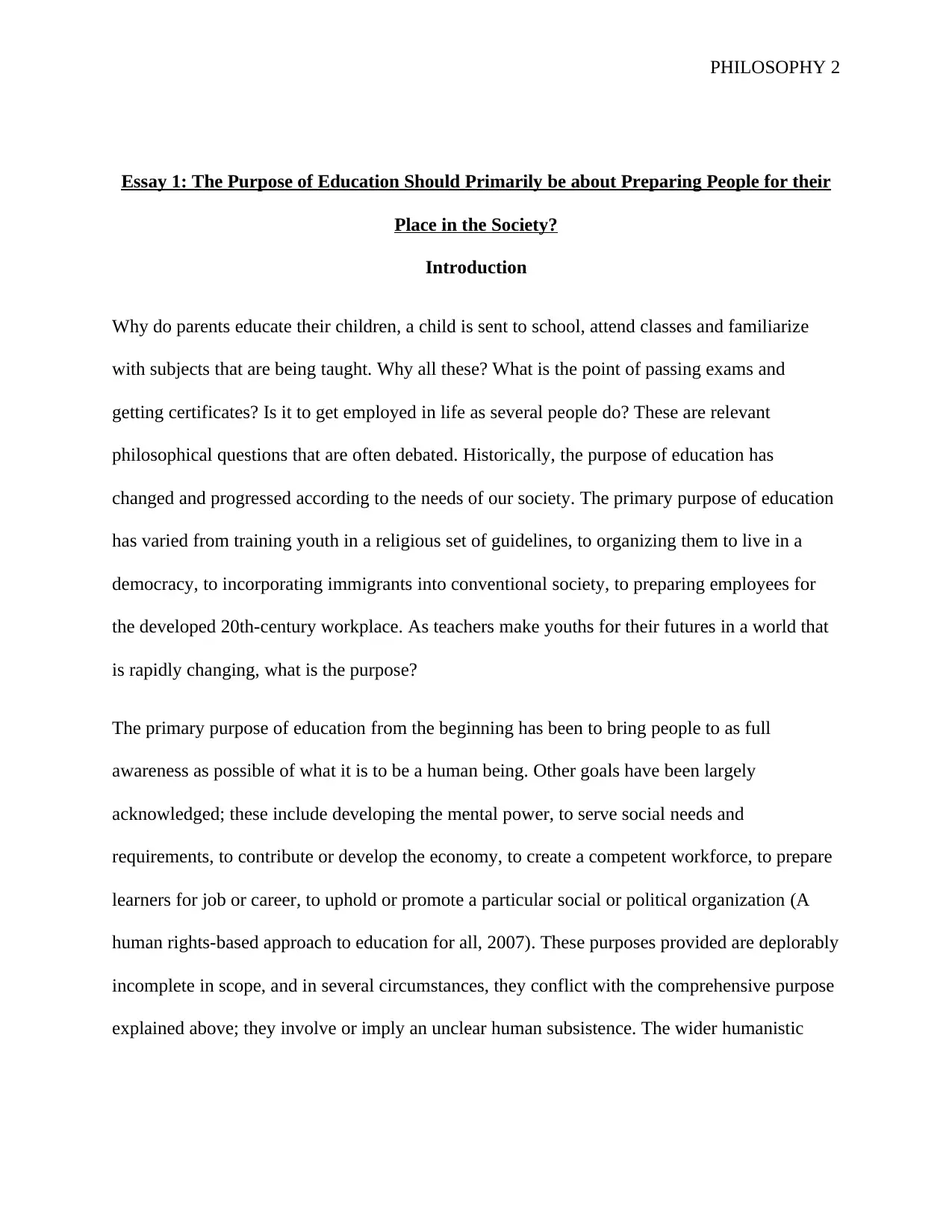
PHILOSOPHY 2
Essay 1: The Purpose of Education Should Primarily be about Preparing People for their
Place in the Society?
Introduction
Why do parents educate their children, a child is sent to school, attend classes and familiarize
with subjects that are being taught. Why all these? What is the point of passing exams and
getting certificates? Is it to get employed in life as several people do? These are relevant
philosophical questions that are often debated. Historically, the purpose of education has
changed and progressed according to the needs of our society. The primary purpose of education
has varied from training youth in a religious set of guidelines, to organizing them to live in a
democracy, to incorporating immigrants into conventional society, to preparing employees for
the developed 20th-century workplace. As teachers make youths for their futures in a world that
is rapidly changing, what is the purpose?
The primary purpose of education from the beginning has been to bring people to as full
awareness as possible of what it is to be a human being. Other goals have been largely
acknowledged; these include developing the mental power, to serve social needs and
requirements, to contribute or develop the economy, to create a competent workforce, to prepare
learners for job or career, to uphold or promote a particular social or political organization (A
human rights-based approach to education for all, 2007). These purposes provided are deplorably
incomplete in scope, and in several circumstances, they conflict with the comprehensive purpose
explained above; they involve or imply an unclear human subsistence. The wider humanistic
Essay 1: The Purpose of Education Should Primarily be about Preparing People for their
Place in the Society?
Introduction
Why do parents educate their children, a child is sent to school, attend classes and familiarize
with subjects that are being taught. Why all these? What is the point of passing exams and
getting certificates? Is it to get employed in life as several people do? These are relevant
philosophical questions that are often debated. Historically, the purpose of education has
changed and progressed according to the needs of our society. The primary purpose of education
has varied from training youth in a religious set of guidelines, to organizing them to live in a
democracy, to incorporating immigrants into conventional society, to preparing employees for
the developed 20th-century workplace. As teachers make youths for their futures in a world that
is rapidly changing, what is the purpose?
The primary purpose of education from the beginning has been to bring people to as full
awareness as possible of what it is to be a human being. Other goals have been largely
acknowledged; these include developing the mental power, to serve social needs and
requirements, to contribute or develop the economy, to create a competent workforce, to prepare
learners for job or career, to uphold or promote a particular social or political organization (A
human rights-based approach to education for all, 2007). These purposes provided are deplorably
incomplete in scope, and in several circumstances, they conflict with the comprehensive purpose
explained above; they involve or imply an unclear human subsistence. The wider humanistic
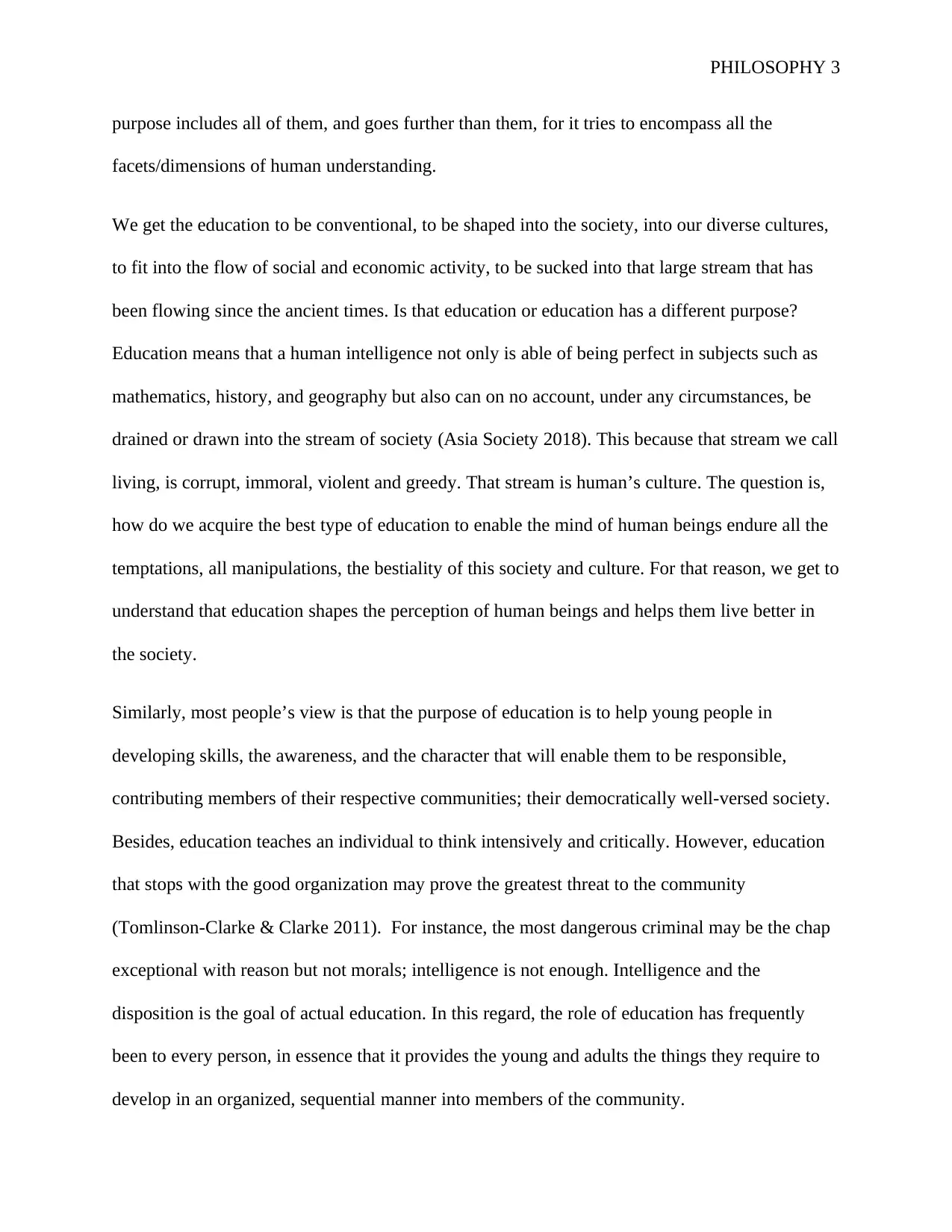
PHILOSOPHY 3
purpose includes all of them, and goes further than them, for it tries to encompass all the
facets/dimensions of human understanding.
We get the education to be conventional, to be shaped into the society, into our diverse cultures,
to fit into the flow of social and economic activity, to be sucked into that large stream that has
been flowing since the ancient times. Is that education or education has a different purpose?
Education means that a human intelligence not only is able of being perfect in subjects such as
mathematics, history, and geography but also can on no account, under any circumstances, be
drained or drawn into the stream of society (Asia Society 2018). This because that stream we call
living, is corrupt, immoral, violent and greedy. That stream is human’s culture. The question is,
how do we acquire the best type of education to enable the mind of human beings endure all the
temptations, all manipulations, the bestiality of this society and culture. For that reason, we get to
understand that education shapes the perception of human beings and helps them live better in
the society.
Similarly, most people’s view is that the purpose of education is to help young people in
developing skills, the awareness, and the character that will enable them to be responsible,
contributing members of their respective communities; their democratically well-versed society.
Besides, education teaches an individual to think intensively and critically. However, education
that stops with the good organization may prove the greatest threat to the community
(Tomlinson-Clarke & Clarke 2011). For instance, the most dangerous criminal may be the chap
exceptional with reason but not morals; intelligence is not enough. Intelligence and the
disposition is the goal of actual education. In this regard, the role of education has frequently
been to every person, in essence that it provides the young and adults the things they require to
develop in an organized, sequential manner into members of the community.
purpose includes all of them, and goes further than them, for it tries to encompass all the
facets/dimensions of human understanding.
We get the education to be conventional, to be shaped into the society, into our diverse cultures,
to fit into the flow of social and economic activity, to be sucked into that large stream that has
been flowing since the ancient times. Is that education or education has a different purpose?
Education means that a human intelligence not only is able of being perfect in subjects such as
mathematics, history, and geography but also can on no account, under any circumstances, be
drained or drawn into the stream of society (Asia Society 2018). This because that stream we call
living, is corrupt, immoral, violent and greedy. That stream is human’s culture. The question is,
how do we acquire the best type of education to enable the mind of human beings endure all the
temptations, all manipulations, the bestiality of this society and culture. For that reason, we get to
understand that education shapes the perception of human beings and helps them live better in
the society.
Similarly, most people’s view is that the purpose of education is to help young people in
developing skills, the awareness, and the character that will enable them to be responsible,
contributing members of their respective communities; their democratically well-versed society.
Besides, education teaches an individual to think intensively and critically. However, education
that stops with the good organization may prove the greatest threat to the community
(Tomlinson-Clarke & Clarke 2011). For instance, the most dangerous criminal may be the chap
exceptional with reason but not morals; intelligence is not enough. Intelligence and the
disposition is the goal of actual education. In this regard, the role of education has frequently
been to every person, in essence that it provides the young and adults the things they require to
develop in an organized, sequential manner into members of the community.
⊘ This is a preview!⊘
Do you want full access?
Subscribe today to unlock all pages.

Trusted by 1+ million students worldwide
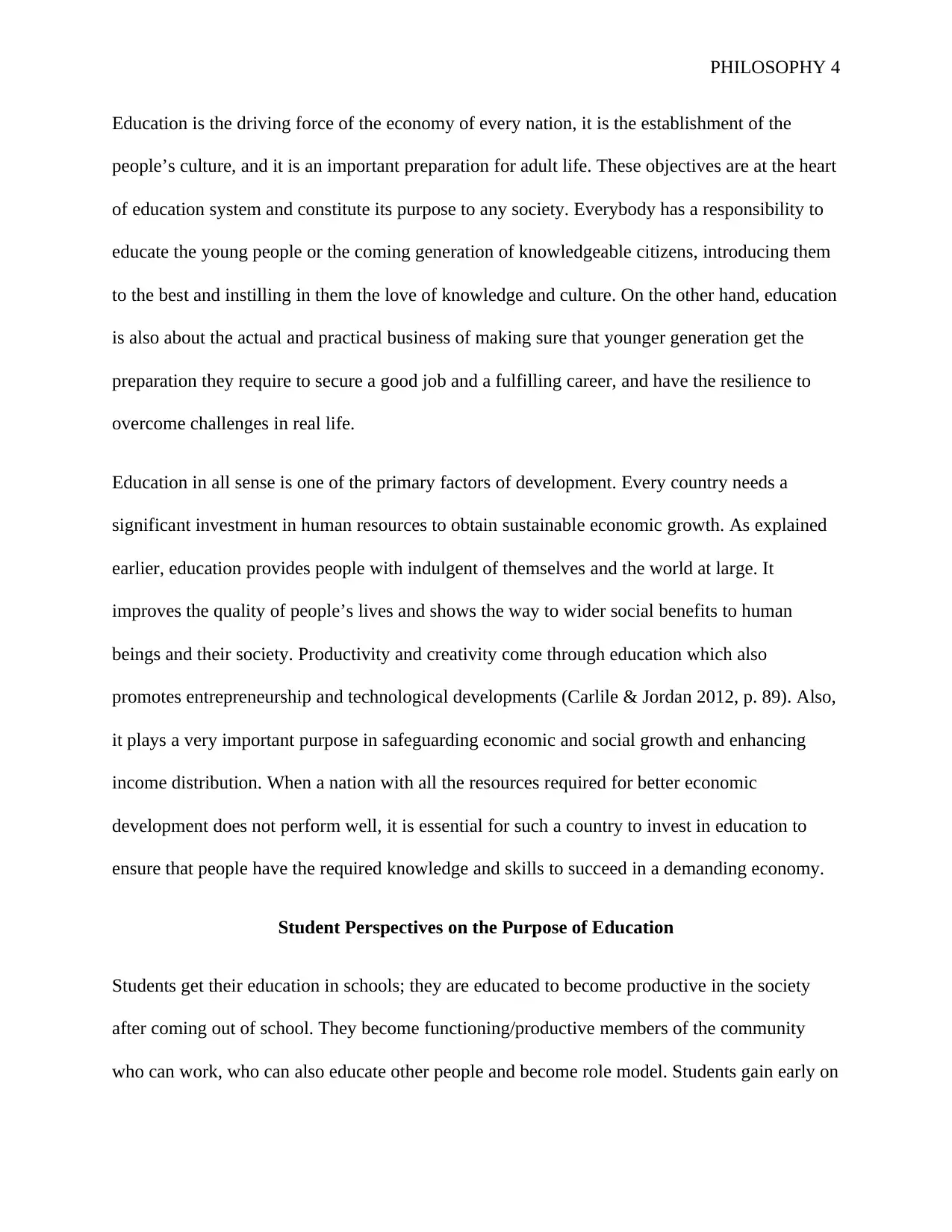
PHILOSOPHY 4
Education is the driving force of the economy of every nation, it is the establishment of the
people’s culture, and it is an important preparation for adult life. These objectives are at the heart
of education system and constitute its purpose to any society. Everybody has a responsibility to
educate the young people or the coming generation of knowledgeable citizens, introducing them
to the best and instilling in them the love of knowledge and culture. On the other hand, education
is also about the actual and practical business of making sure that younger generation get the
preparation they require to secure a good job and a fulfilling career, and have the resilience to
overcome challenges in real life.
Education in all sense is one of the primary factors of development. Every country needs a
significant investment in human resources to obtain sustainable economic growth. As explained
earlier, education provides people with indulgent of themselves and the world at large. It
improves the quality of people’s lives and shows the way to wider social benefits to human
beings and their society. Productivity and creativity come through education which also
promotes entrepreneurship and technological developments (Carlile & Jordan 2012, p. 89). Also,
it plays a very important purpose in safeguarding economic and social growth and enhancing
income distribution. When a nation with all the resources required for better economic
development does not perform well, it is essential for such a country to invest in education to
ensure that people have the required knowledge and skills to succeed in a demanding economy.
Student Perspectives on the Purpose of Education
Students get their education in schools; they are educated to become productive in the society
after coming out of school. They become functioning/productive members of the community
who can work, who can also educate other people and become role model. Students gain early on
Education is the driving force of the economy of every nation, it is the establishment of the
people’s culture, and it is an important preparation for adult life. These objectives are at the heart
of education system and constitute its purpose to any society. Everybody has a responsibility to
educate the young people or the coming generation of knowledgeable citizens, introducing them
to the best and instilling in them the love of knowledge and culture. On the other hand, education
is also about the actual and practical business of making sure that younger generation get the
preparation they require to secure a good job and a fulfilling career, and have the resilience to
overcome challenges in real life.
Education in all sense is one of the primary factors of development. Every country needs a
significant investment in human resources to obtain sustainable economic growth. As explained
earlier, education provides people with indulgent of themselves and the world at large. It
improves the quality of people’s lives and shows the way to wider social benefits to human
beings and their society. Productivity and creativity come through education which also
promotes entrepreneurship and technological developments (Carlile & Jordan 2012, p. 89). Also,
it plays a very important purpose in safeguarding economic and social growth and enhancing
income distribution. When a nation with all the resources required for better economic
development does not perform well, it is essential for such a country to invest in education to
ensure that people have the required knowledge and skills to succeed in a demanding economy.
Student Perspectives on the Purpose of Education
Students get their education in schools; they are educated to become productive in the society
after coming out of school. They become functioning/productive members of the community
who can work, who can also educate other people and become role model. Students gain early on
Paraphrase This Document
Need a fresh take? Get an instant paraphrase of this document with our AI Paraphraser
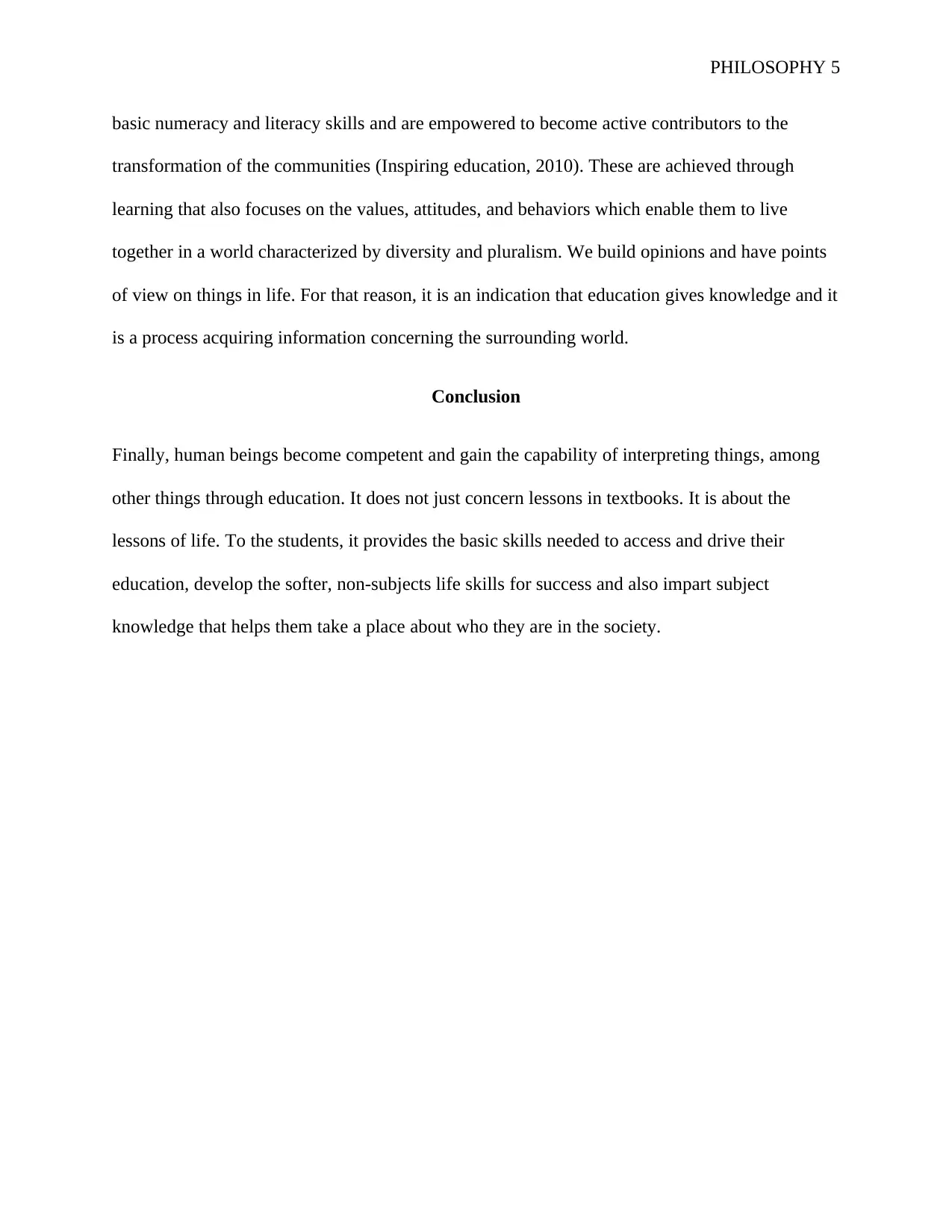
PHILOSOPHY 5
basic numeracy and literacy skills and are empowered to become active contributors to the
transformation of the communities (Inspiring education, 2010). These are achieved through
learning that also focuses on the values, attitudes, and behaviors which enable them to live
together in a world characterized by diversity and pluralism. We build opinions and have points
of view on things in life. For that reason, it is an indication that education gives knowledge and it
is a process acquiring information concerning the surrounding world.
Conclusion
Finally, human beings become competent and gain the capability of interpreting things, among
other things through education. It does not just concern lessons in textbooks. It is about the
lessons of life. To the students, it provides the basic skills needed to access and drive their
education, develop the softer, non-subjects life skills for success and also impart subject
knowledge that helps them take a place about who they are in the society.
basic numeracy and literacy skills and are empowered to become active contributors to the
transformation of the communities (Inspiring education, 2010). These are achieved through
learning that also focuses on the values, attitudes, and behaviors which enable them to live
together in a world characterized by diversity and pluralism. We build opinions and have points
of view on things in life. For that reason, it is an indication that education gives knowledge and it
is a process acquiring information concerning the surrounding world.
Conclusion
Finally, human beings become competent and gain the capability of interpreting things, among
other things through education. It does not just concern lessons in textbooks. It is about the
lessons of life. To the students, it provides the basic skills needed to access and drive their
education, develop the softer, non-subjects life skills for success and also impart subject
knowledge that helps them take a place about who they are in the society.
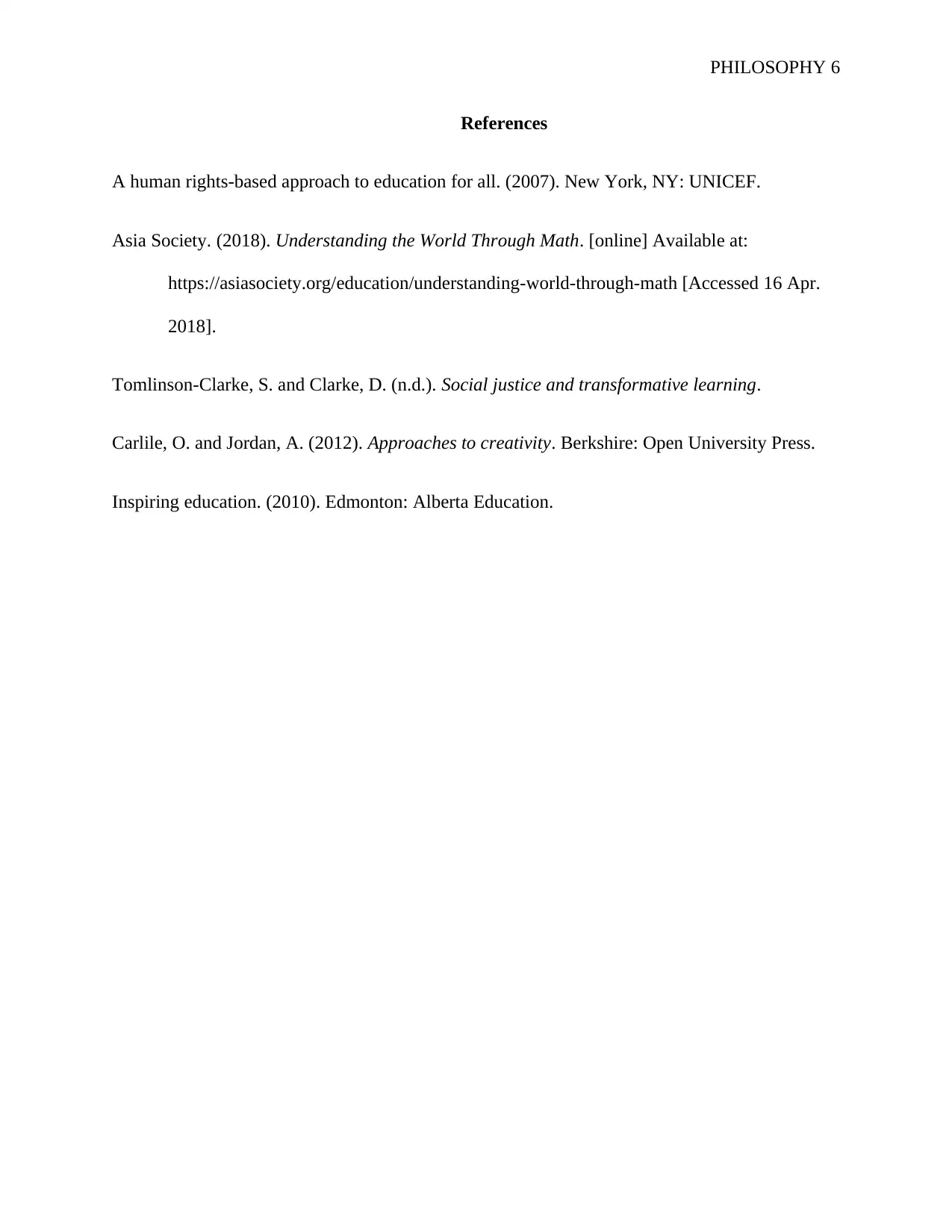
PHILOSOPHY 6
References
A human rights-based approach to education for all. (2007). New York, NY: UNICEF.
Asia Society. (2018). Understanding the World Through Math. [online] Available at:
https://asiasociety.org/education/understanding-world-through-math [Accessed 16 Apr.
2018].
Tomlinson-Clarke, S. and Clarke, D. (n.d.). Social justice and transformative learning.
Carlile, O. and Jordan, A. (2012). Approaches to creativity. Berkshire: Open University Press.
Inspiring education. (2010). Edmonton: Alberta Education.
References
A human rights-based approach to education for all. (2007). New York, NY: UNICEF.
Asia Society. (2018). Understanding the World Through Math. [online] Available at:
https://asiasociety.org/education/understanding-world-through-math [Accessed 16 Apr.
2018].
Tomlinson-Clarke, S. and Clarke, D. (n.d.). Social justice and transformative learning.
Carlile, O. and Jordan, A. (2012). Approaches to creativity. Berkshire: Open University Press.
Inspiring education. (2010). Edmonton: Alberta Education.
⊘ This is a preview!⊘
Do you want full access?
Subscribe today to unlock all pages.

Trusted by 1+ million students worldwide
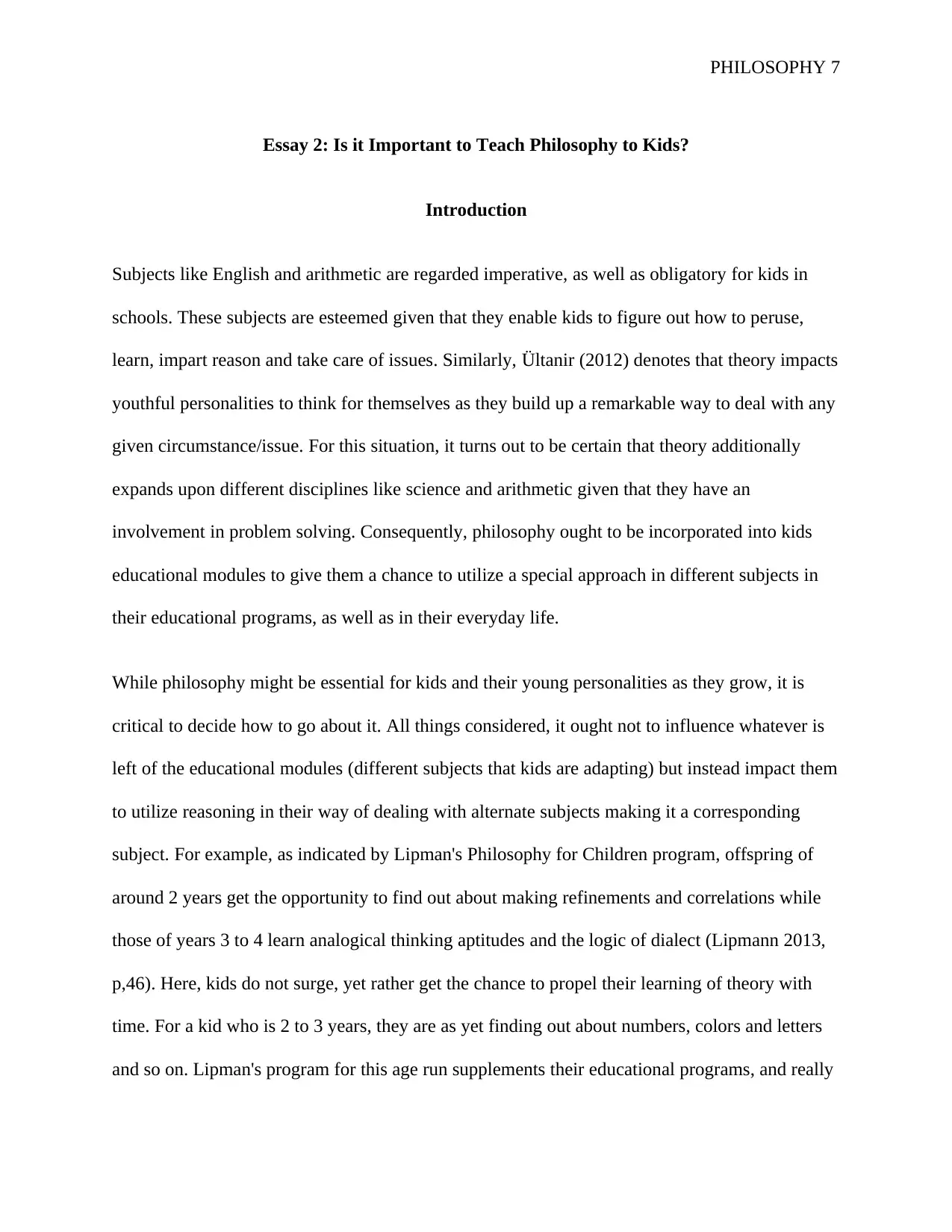
PHILOSOPHY 7
Essay 2: Is it Important to Teach Philosophy to Kids?
Introduction
Subjects like English and arithmetic are regarded imperative, as well as obligatory for kids in
schools. These subjects are esteemed given that they enable kids to figure out how to peruse,
learn, impart reason and take care of issues. Similarly, Ültanir (2012) denotes that theory impacts
youthful personalities to think for themselves as they build up a remarkable way to deal with any
given circumstance/issue. For this situation, it turns out to be certain that theory additionally
expands upon different disciplines like science and arithmetic given that they have an
involvement in problem solving. Consequently, philosophy ought to be incorporated into kids
educational modules to give them a chance to utilize a special approach in different subjects in
their educational programs, as well as in their everyday life.
While philosophy might be essential for kids and their young personalities as they grow, it is
critical to decide how to go about it. All things considered, it ought not to influence whatever is
left of the educational modules (different subjects that kids are adapting) but instead impact them
to utilize reasoning in their way of dealing with alternate subjects making it a corresponding
subject. For example, as indicated by Lipman's Philosophy for Children program, offspring of
around 2 years get the opportunity to find out about making refinements and correlations while
those of years 3 to 4 learn analogical thinking aptitudes and the logic of dialect (Lipmann 2013,
p,46). Here, kids do not surge, yet rather get the chance to propel their learning of theory with
time. For a kid who is 2 to 3 years, they are as yet finding out about numbers, colors and letters
and so on. Lipman's program for this age run supplements their educational programs, and really
Essay 2: Is it Important to Teach Philosophy to Kids?
Introduction
Subjects like English and arithmetic are regarded imperative, as well as obligatory for kids in
schools. These subjects are esteemed given that they enable kids to figure out how to peruse,
learn, impart reason and take care of issues. Similarly, Ültanir (2012) denotes that theory impacts
youthful personalities to think for themselves as they build up a remarkable way to deal with any
given circumstance/issue. For this situation, it turns out to be certain that theory additionally
expands upon different disciplines like science and arithmetic given that they have an
involvement in problem solving. Consequently, philosophy ought to be incorporated into kids
educational modules to give them a chance to utilize a special approach in different subjects in
their educational programs, as well as in their everyday life.
While philosophy might be essential for kids and their young personalities as they grow, it is
critical to decide how to go about it. All things considered, it ought not to influence whatever is
left of the educational modules (different subjects that kids are adapting) but instead impact them
to utilize reasoning in their way of dealing with alternate subjects making it a corresponding
subject. For example, as indicated by Lipman's Philosophy for Children program, offspring of
around 2 years get the opportunity to find out about making refinements and correlations while
those of years 3 to 4 learn analogical thinking aptitudes and the logic of dialect (Lipmann 2013,
p,46). Here, kids do not surge, yet rather get the chance to propel their learning of theory with
time. For a kid who is 2 to 3 years, they are as yet finding out about numbers, colors and letters
and so on. Lipman's program for this age run supplements their educational programs, and really
Paraphrase This Document
Need a fresh take? Get an instant paraphrase of this document with our AI Paraphraser
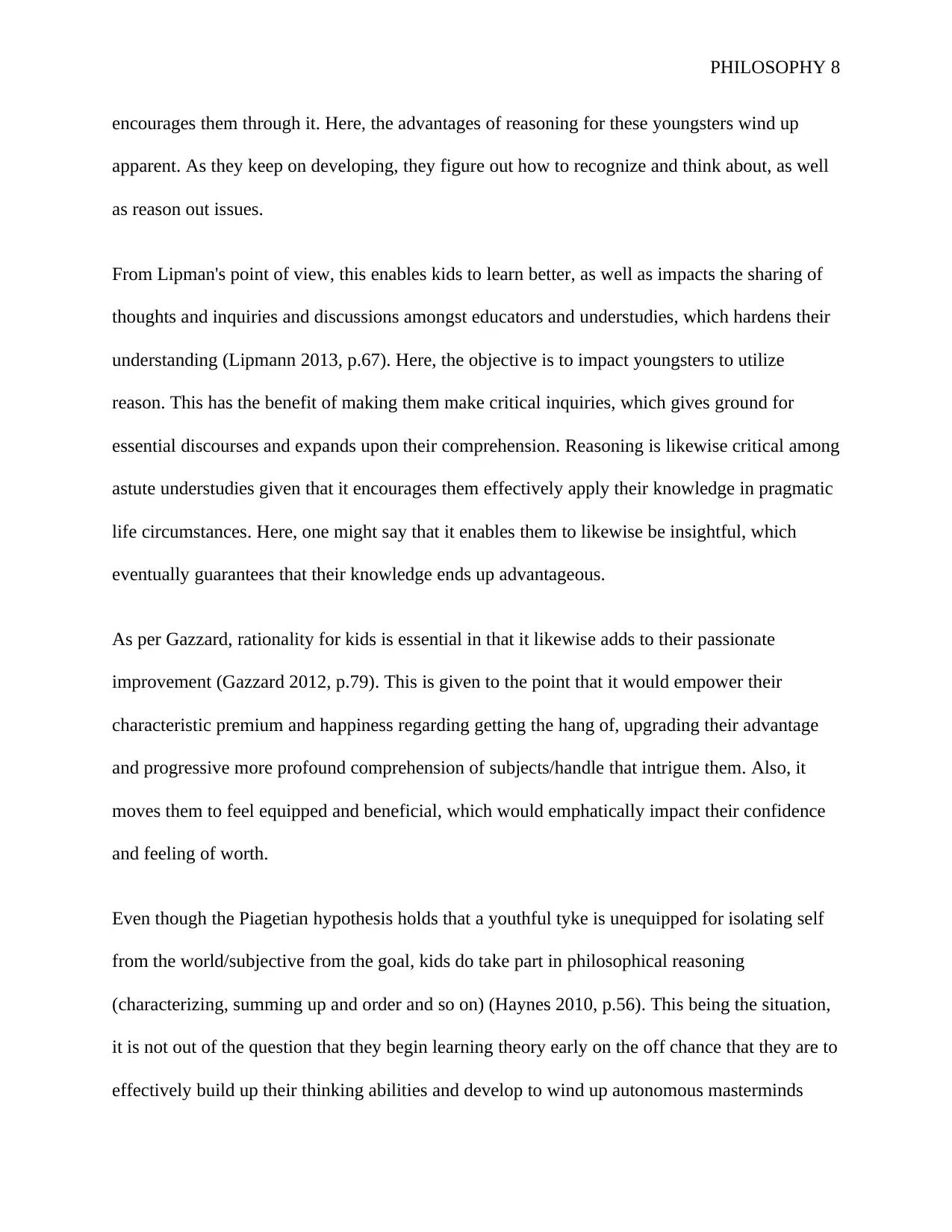
PHILOSOPHY 8
encourages them through it. Here, the advantages of reasoning for these youngsters wind up
apparent. As they keep on developing, they figure out how to recognize and think about, as well
as reason out issues.
From Lipman's point of view, this enables kids to learn better, as well as impacts the sharing of
thoughts and inquiries and discussions amongst educators and understudies, which hardens their
understanding (Lipmann 2013, p.67). Here, the objective is to impact youngsters to utilize
reason. This has the benefit of making them make critical inquiries, which gives ground for
essential discourses and expands upon their comprehension. Reasoning is likewise critical among
astute understudies given that it encourages them effectively apply their knowledge in pragmatic
life circumstances. Here, one might say that it enables them to likewise be insightful, which
eventually guarantees that their knowledge ends up advantageous.
As per Gazzard, rationality for kids is essential in that it likewise adds to their passionate
improvement (Gazzard 2012, p.79). This is given to the point that it would empower their
characteristic premium and happiness regarding getting the hang of, upgrading their advantage
and progressive more profound comprehension of subjects/handle that intrigue them. Also, it
moves them to feel equipped and beneficial, which would emphatically impact their confidence
and feeling of worth.
Even though the Piagetian hypothesis holds that a youthful tyke is unequipped for isolating self
from the world/subjective from the goal, kids do take part in philosophical reasoning
(characterizing, summing up and order and so on) (Haynes 2010, p.56). This being the situation,
it is not out of the question that they begin learning theory early on the off chance that they are to
effectively build up their thinking abilities and develop to wind up autonomous masterminds
encourages them through it. Here, the advantages of reasoning for these youngsters wind up
apparent. As they keep on developing, they figure out how to recognize and think about, as well
as reason out issues.
From Lipman's point of view, this enables kids to learn better, as well as impacts the sharing of
thoughts and inquiries and discussions amongst educators and understudies, which hardens their
understanding (Lipmann 2013, p.67). Here, the objective is to impact youngsters to utilize
reason. This has the benefit of making them make critical inquiries, which gives ground for
essential discourses and expands upon their comprehension. Reasoning is likewise critical among
astute understudies given that it encourages them effectively apply their knowledge in pragmatic
life circumstances. Here, one might say that it enables them to likewise be insightful, which
eventually guarantees that their knowledge ends up advantageous.
As per Gazzard, rationality for kids is essential in that it likewise adds to their passionate
improvement (Gazzard 2012, p.79). This is given to the point that it would empower their
characteristic premium and happiness regarding getting the hang of, upgrading their advantage
and progressive more profound comprehension of subjects/handle that intrigue them. Also, it
moves them to feel equipped and beneficial, which would emphatically impact their confidence
and feeling of worth.
Even though the Piagetian hypothesis holds that a youthful tyke is unequipped for isolating self
from the world/subjective from the goal, kids do take part in philosophical reasoning
(characterizing, summing up and order and so on) (Haynes 2010, p.56). This being the situation,
it is not out of the question that they begin learning theory early on the off chance that they are to
effectively build up their thinking abilities and develop to wind up autonomous masterminds
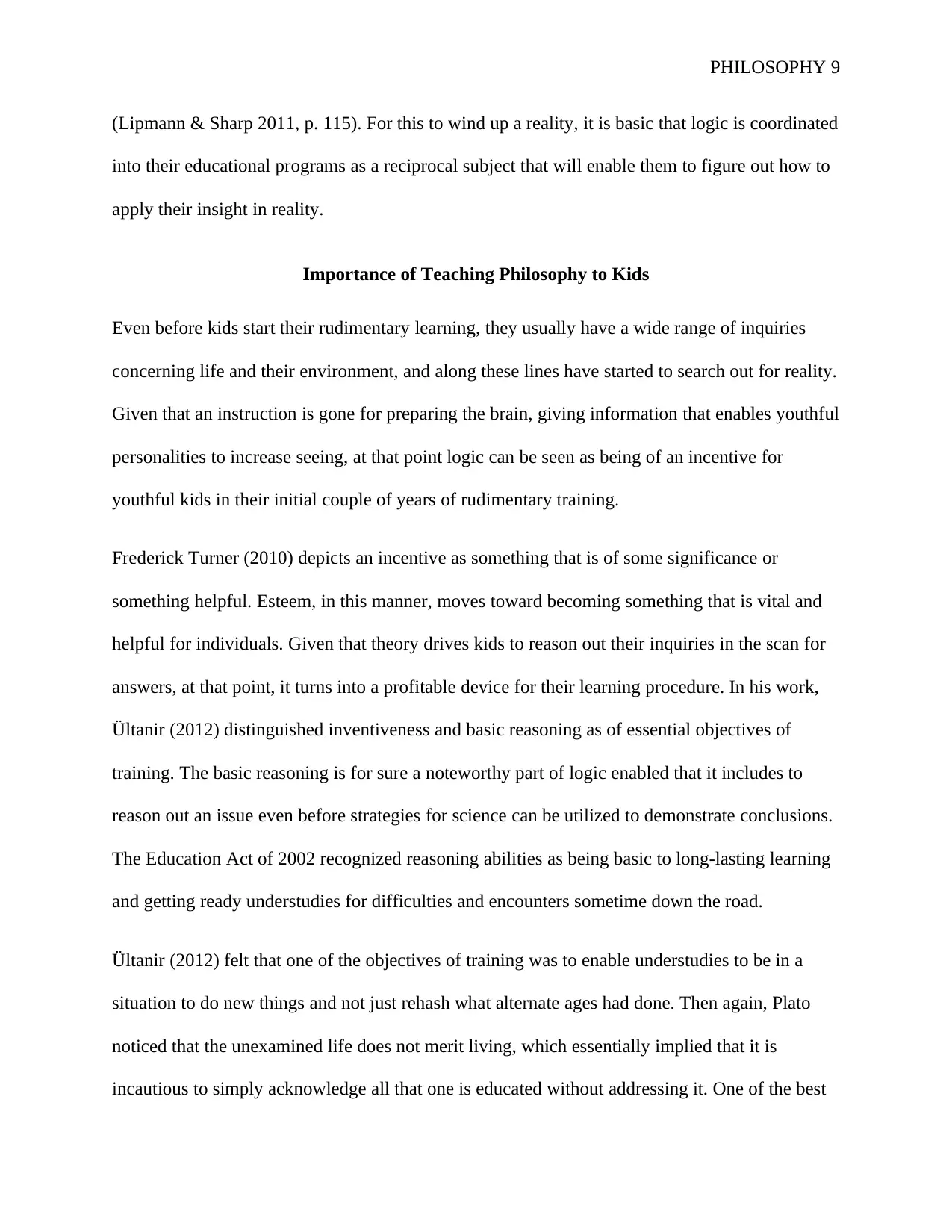
PHILOSOPHY 9
(Lipmann & Sharp 2011, p. 115). For this to wind up a reality, it is basic that logic is coordinated
into their educational programs as a reciprocal subject that will enable them to figure out how to
apply their insight in reality.
Importance of Teaching Philosophy to Kids
Even before kids start their rudimentary learning, they usually have a wide range of inquiries
concerning life and their environment, and along these lines have started to search out for reality.
Given that an instruction is gone for preparing the brain, giving information that enables youthful
personalities to increase seeing, at that point logic can be seen as being of an incentive for
youthful kids in their initial couple of years of rudimentary training.
Frederick Turner (2010) depicts an incentive as something that is of some significance or
something helpful. Esteem, in this manner, moves toward becoming something that is vital and
helpful for individuals. Given that theory drives kids to reason out their inquiries in the scan for
answers, at that point, it turns into a profitable device for their learning procedure. In his work,
Ültanir (2012) distinguished inventiveness and basic reasoning as of essential objectives of
training. The basic reasoning is for sure a noteworthy part of logic enabled that it includes to
reason out an issue even before strategies for science can be utilized to demonstrate conclusions.
The Education Act of 2002 recognized reasoning abilities as being basic to long-lasting learning
and getting ready understudies for difficulties and encounters sometime down the road.
Ültanir (2012) felt that one of the objectives of training was to enable understudies to be in a
situation to do new things and not just rehash what alternate ages had done. Then again, Plato
noticed that the unexamined life does not merit living, which essentially implied that it is
incautious to simply acknowledge all that one is educated without addressing it. One of the best
(Lipmann & Sharp 2011, p. 115). For this to wind up a reality, it is basic that logic is coordinated
into their educational programs as a reciprocal subject that will enable them to figure out how to
apply their insight in reality.
Importance of Teaching Philosophy to Kids
Even before kids start their rudimentary learning, they usually have a wide range of inquiries
concerning life and their environment, and along these lines have started to search out for reality.
Given that an instruction is gone for preparing the brain, giving information that enables youthful
personalities to increase seeing, at that point logic can be seen as being of an incentive for
youthful kids in their initial couple of years of rudimentary training.
Frederick Turner (2010) depicts an incentive as something that is of some significance or
something helpful. Esteem, in this manner, moves toward becoming something that is vital and
helpful for individuals. Given that theory drives kids to reason out their inquiries in the scan for
answers, at that point, it turns into a profitable device for their learning procedure. In his work,
Ültanir (2012) distinguished inventiveness and basic reasoning as of essential objectives of
training. The basic reasoning is for sure a noteworthy part of logic enabled that it includes to
reason out an issue even before strategies for science can be utilized to demonstrate conclusions.
The Education Act of 2002 recognized reasoning abilities as being basic to long-lasting learning
and getting ready understudies for difficulties and encounters sometime down the road.
Ültanir (2012) felt that one of the objectives of training was to enable understudies to be in a
situation to do new things and not just rehash what alternate ages had done. Then again, Plato
noticed that the unexamined life does not merit living, which essentially implied that it is
incautious to simply acknowledge all that one is educated without addressing it. One of the best
⊘ This is a preview!⊘
Do you want full access?
Subscribe today to unlock all pages.

Trusted by 1+ million students worldwide
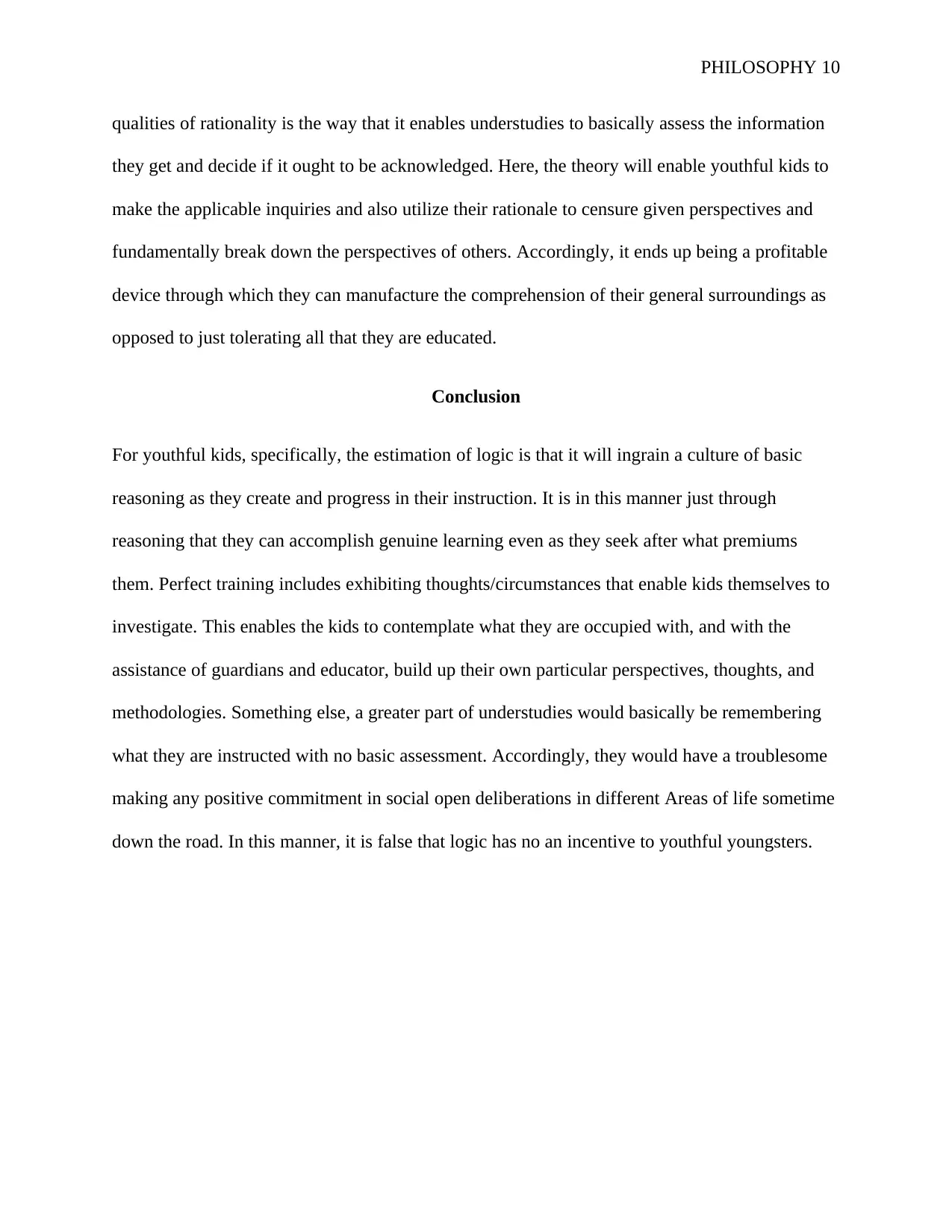
PHILOSOPHY 10
qualities of rationality is the way that it enables understudies to basically assess the information
they get and decide if it ought to be acknowledged. Here, the theory will enable youthful kids to
make the applicable inquiries and also utilize their rationale to censure given perspectives and
fundamentally break down the perspectives of others. Accordingly, it ends up being a profitable
device through which they can manufacture the comprehension of their general surroundings as
opposed to just tolerating all that they are educated.
Conclusion
For youthful kids, specifically, the estimation of logic is that it will ingrain a culture of basic
reasoning as they create and progress in their instruction. It is in this manner just through
reasoning that they can accomplish genuine learning even as they seek after what premiums
them. Perfect training includes exhibiting thoughts/circumstances that enable kids themselves to
investigate. This enables the kids to contemplate what they are occupied with, and with the
assistance of guardians and educator, build up their own particular perspectives, thoughts, and
methodologies. Something else, a greater part of understudies would basically be remembering
what they are instructed with no basic assessment. Accordingly, they would have a troublesome
making any positive commitment in social open deliberations in different Areas of life sometime
down the road. In this manner, it is false that logic has no an incentive to youthful youngsters.
qualities of rationality is the way that it enables understudies to basically assess the information
they get and decide if it ought to be acknowledged. Here, the theory will enable youthful kids to
make the applicable inquiries and also utilize their rationale to censure given perspectives and
fundamentally break down the perspectives of others. Accordingly, it ends up being a profitable
device through which they can manufacture the comprehension of their general surroundings as
opposed to just tolerating all that they are educated.
Conclusion
For youthful kids, specifically, the estimation of logic is that it will ingrain a culture of basic
reasoning as they create and progress in their instruction. It is in this manner just through
reasoning that they can accomplish genuine learning even as they seek after what premiums
them. Perfect training includes exhibiting thoughts/circumstances that enable kids themselves to
investigate. This enables the kids to contemplate what they are occupied with, and with the
assistance of guardians and educator, build up their own particular perspectives, thoughts, and
methodologies. Something else, a greater part of understudies would basically be remembering
what they are instructed with no basic assessment. Accordingly, they would have a troublesome
making any positive commitment in social open deliberations in different Areas of life sometime
down the road. In this manner, it is false that logic has no an incentive to youthful youngsters.
Paraphrase This Document
Need a fresh take? Get an instant paraphrase of this document with our AI Paraphraser

PHILOSOPHY 11
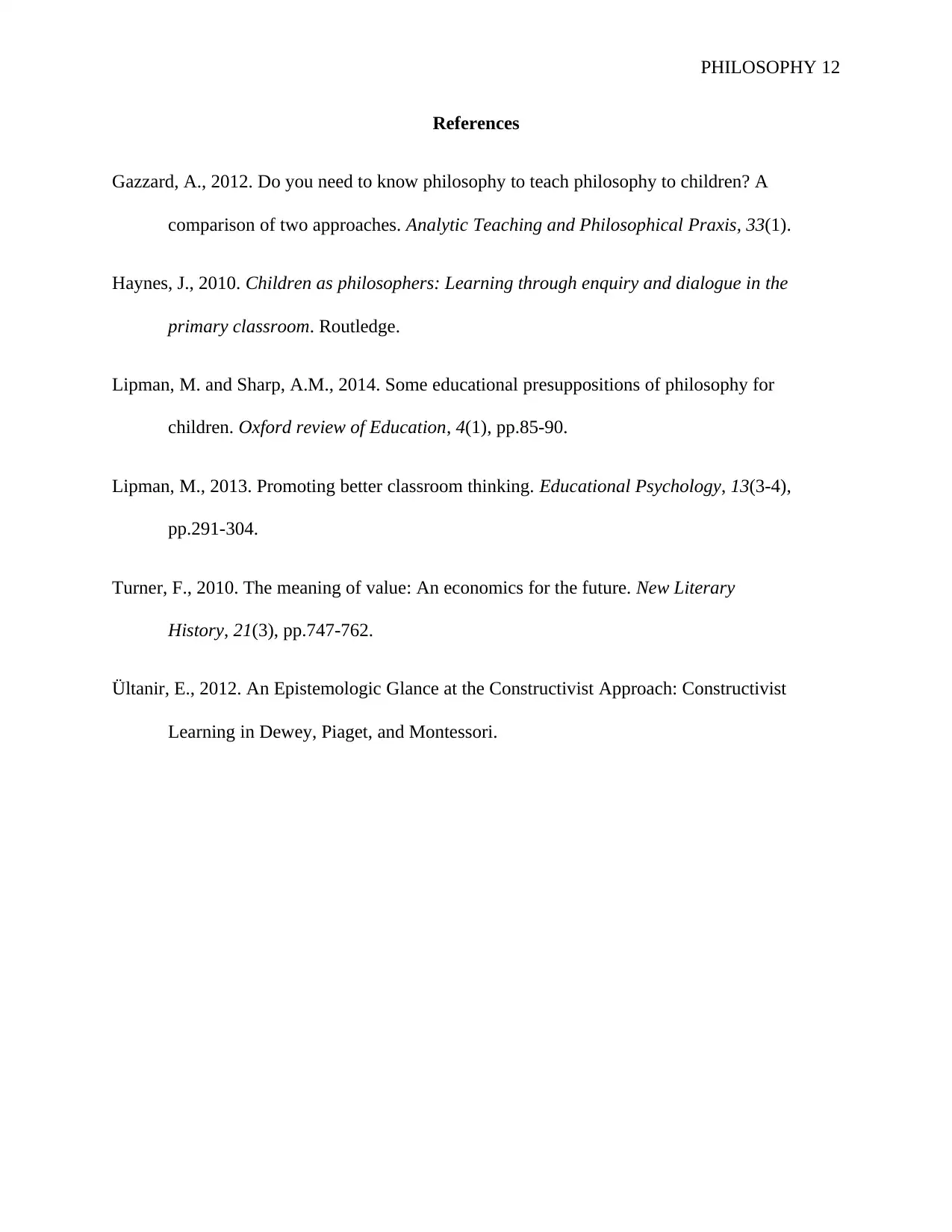
PHILOSOPHY 12
References
Gazzard, A., 2012. Do you need to know philosophy to teach philosophy to children? A
comparison of two approaches. Analytic Teaching and Philosophical Praxis, 33(1).
Haynes, J., 2010. Children as philosophers: Learning through enquiry and dialogue in the
primary classroom. Routledge.
Lipman, M. and Sharp, A.M., 2014. Some educational presuppositions of philosophy for
children. Oxford review of Education, 4(1), pp.85-90.
Lipman, M., 2013. Promoting better classroom thinking. Educational Psychology, 13(3-4),
pp.291-304.
Turner, F., 2010. The meaning of value: An economics for the future. New Literary
History, 21(3), pp.747-762.
Ültanir, E., 2012. An Epistemologic Glance at the Constructivist Approach: Constructivist
Learning in Dewey, Piaget, and Montessori.
References
Gazzard, A., 2012. Do you need to know philosophy to teach philosophy to children? A
comparison of two approaches. Analytic Teaching and Philosophical Praxis, 33(1).
Haynes, J., 2010. Children as philosophers: Learning through enquiry and dialogue in the
primary classroom. Routledge.
Lipman, M. and Sharp, A.M., 2014. Some educational presuppositions of philosophy for
children. Oxford review of Education, 4(1), pp.85-90.
Lipman, M., 2013. Promoting better classroom thinking. Educational Psychology, 13(3-4),
pp.291-304.
Turner, F., 2010. The meaning of value: An economics for the future. New Literary
History, 21(3), pp.747-762.
Ültanir, E., 2012. An Epistemologic Glance at the Constructivist Approach: Constructivist
Learning in Dewey, Piaget, and Montessori.
⊘ This is a preview!⊘
Do you want full access?
Subscribe today to unlock all pages.

Trusted by 1+ million students worldwide
1 out of 24
Related Documents
Your All-in-One AI-Powered Toolkit for Academic Success.
+13062052269
info@desklib.com
Available 24*7 on WhatsApp / Email
![[object Object]](/_next/static/media/star-bottom.7253800d.svg)
Unlock your academic potential
Copyright © 2020–2026 A2Z Services. All Rights Reserved. Developed and managed by ZUCOL.





